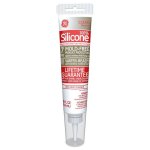Usually after I am sure I won’t be dismantling I use 100% silicone squirted into the sockets.
Doesn't sound like a very good idea. I've never seen anyone do that.
As stupid as this may sound, the sockets and tubes (and PCB itself) are made to get hot. The heat radiates up and out - it's why tubes are best mounted pointing up.
Thermal conductivity in ceramic sockets would be quite low, so would act to shield the PCB from heat as well.
jeff
Build Log: P Millett's DCPP "Engineer's Amp"
No not grease.
This performs in the same way hot glue might, but with a higher melting temp.
As someone stated, the RTV Silicone as found in auto parts store or 100% Silicone Sealant as used in bathrooms etc. (not caulk)
I imagine this also serves vibration damping functions which could be helpful in some scenarios.
I’ve seen it commonly used in guitar / musical amplifiers / pedals / etc.
I wouldn't put anything in the socket that isn't recommended by the manufacturer, especially working with high voltage, where things can easily burn up from pulling through the higher resistances, or arc as the silicone (grease, I assume?) attracts dust and dander from the room.
No not grease.
This performs in the same way hot glue might, but with a higher melting temp.
As someone stated, the RTV Silicone as found in auto parts store or 100% Silicone Sealant as used in bathrooms etc. (not caulk)
I imagine this also serves vibration damping functions which could be helpful in some scenarios.
I’ve seen it commonly used in guitar / musical amplifiers / pedals / etc.
Attachments
Last edited:
I've been building electronics stuff for many years, and will only use leaded multicore solder ie that has it's own flux. It's easier to work with, than applying flux separately and I get good joints every time. I wouldn't waste time with separate flux paste.
Sent from my phone. Please excuse any typpos.
I've taken professional soldering courses and they ALWAYS stress to use flux.
So I am working on a set of these mono blocks. Was thinking about soldering in screw terminal blocks for the PCB connection which would make it easier to remove and modify the board if I have any issues. Any thoughts on whether or not this would compromise the sound or performance?
Regarding flux, I use Kester no clean liquid solder in a syringe with a dull needle. It seems to work quite well and makes beautiful solder joints. Prior to using the liquid flux, I would often times get weird looking solder globs or cold solder joints. Although the solder with the flux core is nice for general projects, I wouldn't venture into this one with using a high quality solder and a good flux. I am using Kardas the metal mix solder and Kester flux. The solder has a fancier name that I can't remember but I mentioned it prior.
- Status
- This old topic is closed. If you want to reopen this topic, contact a moderator using the "Report Post" button.
